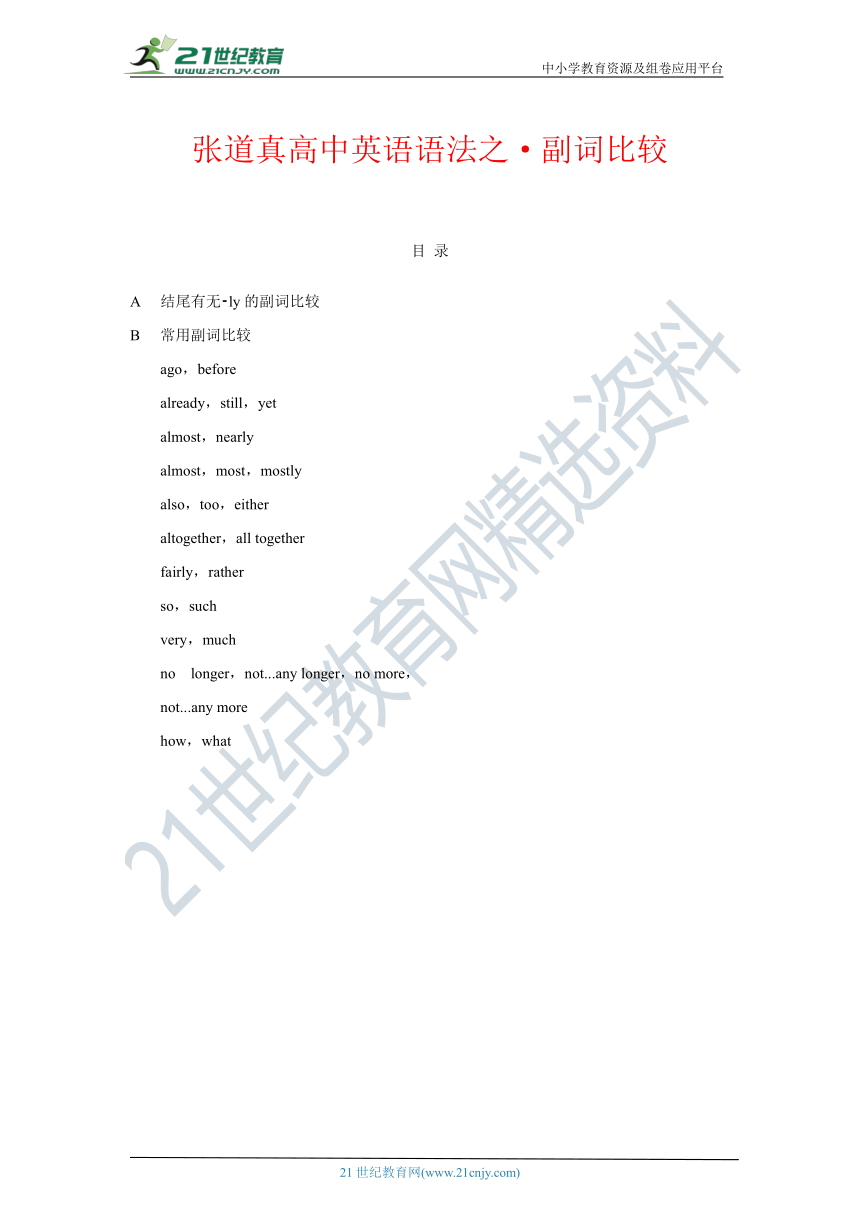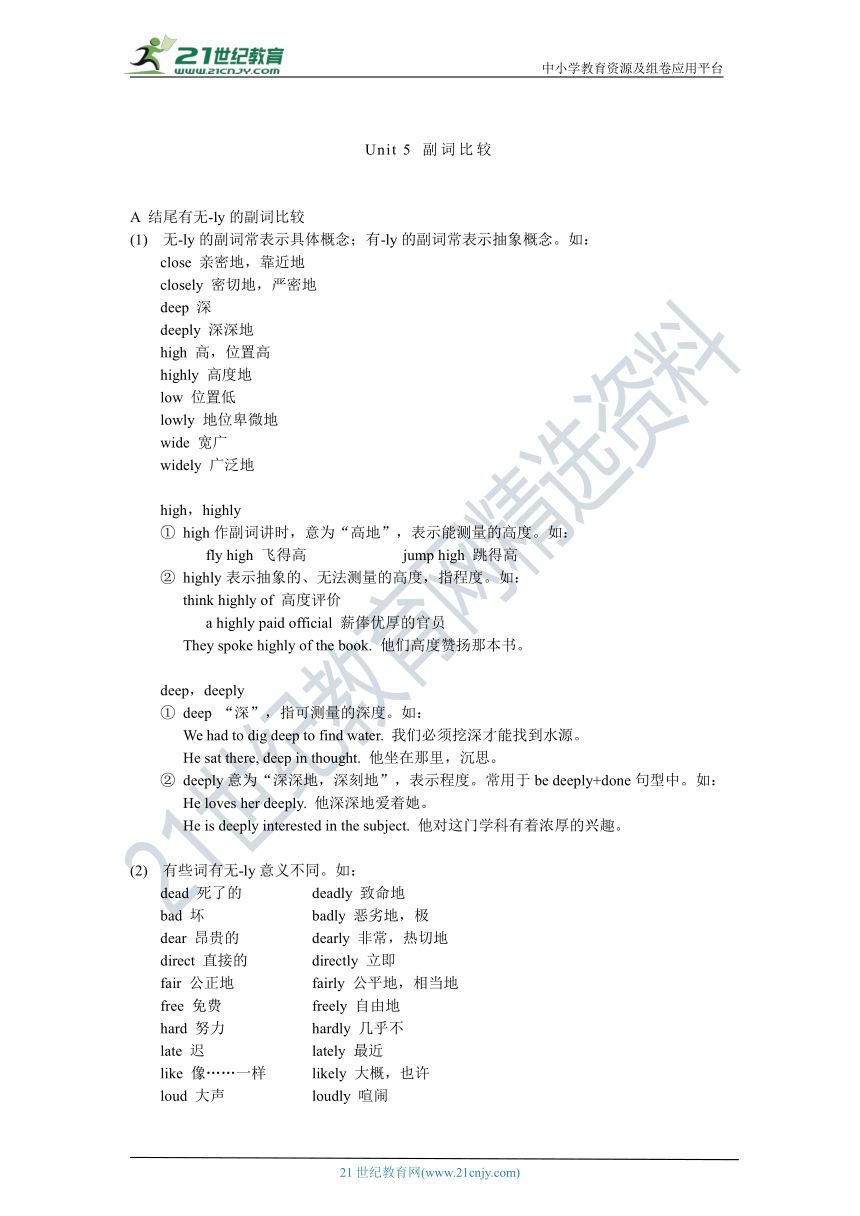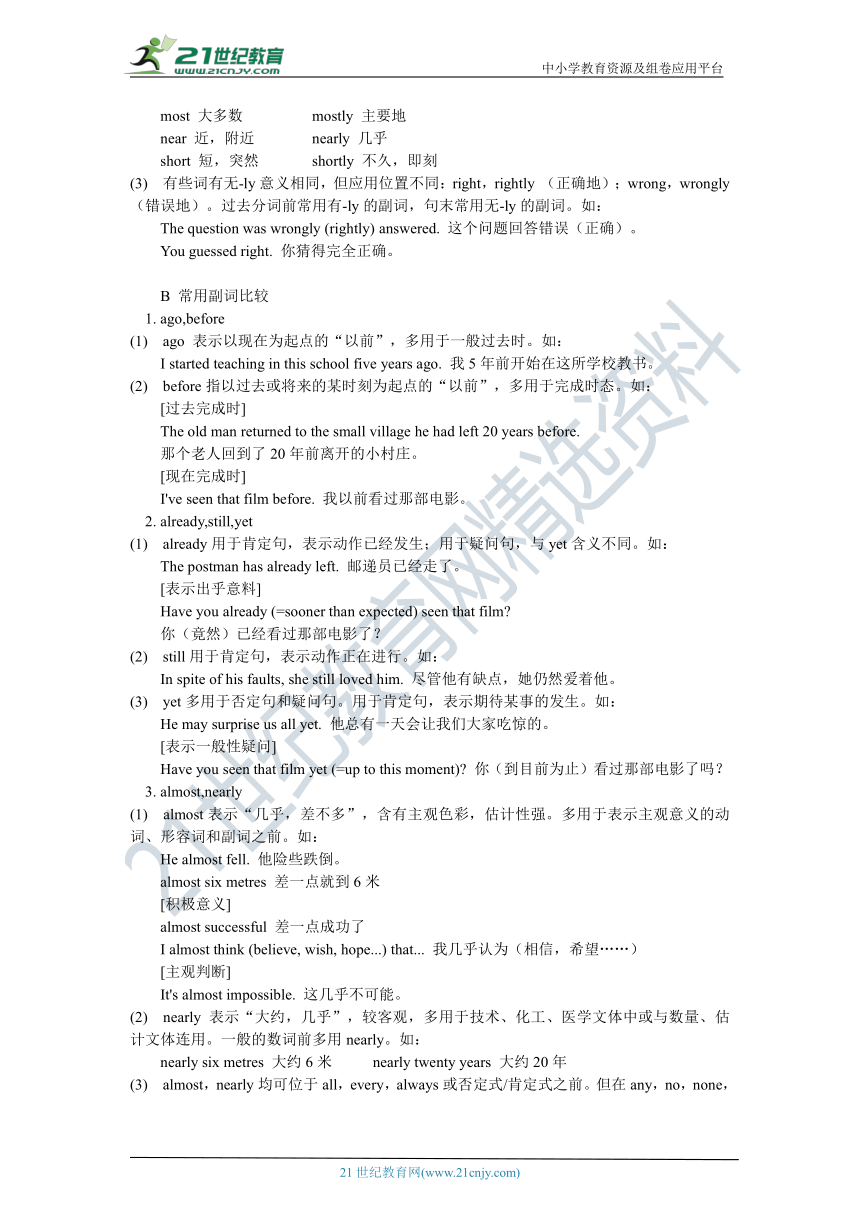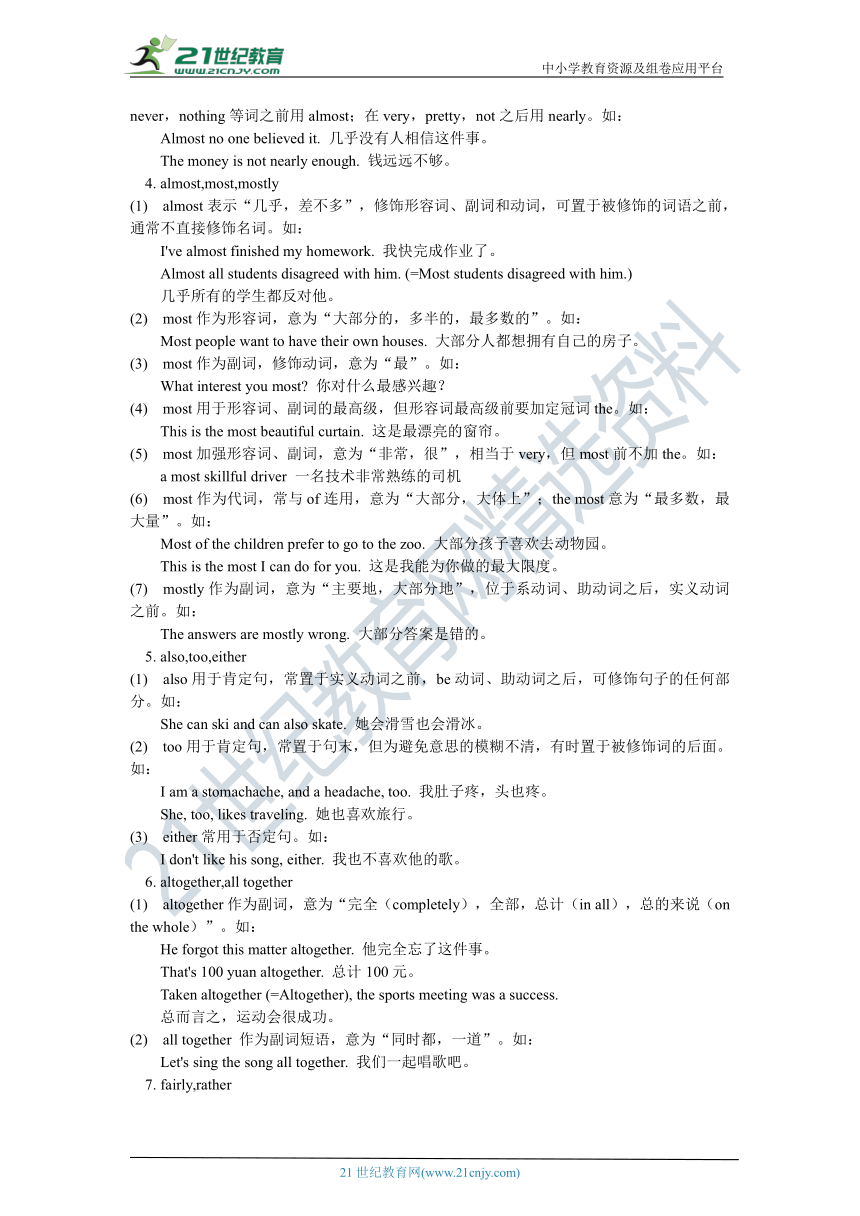高中英语语法之5副词比较
图片预览




文档简介
中小学教育资源及组卷应用平台
张道真高中英语语法之·副词比较
目 录
A 结尾有无?ly的副词比较
B 常用副词比较
????ago,before
????already,still,yet
????almost,nearly
????almost,most,mostly
????also,too,either
????altogether,all together
????fairly,rather
????so,such
????very,much
no longer,not...any longer,no more,
not...any more
how,what
Unit 5 副词比较
A 结尾有无-ly的副词比较
(1) 无-ly的副词常表示具体概念;有-ly的副词常表示抽象概念。如:
close 亲密地,靠近地
closely 密切地,严密地
deep 深
deeply 深深地
high 高,位置高
highly 高度地
low 位置低
lowly 地位卑微地
wide 宽广
widely 广泛地
high,highly
① high作副词讲时,意为“高地”,表示能测量的高度。如:
fly high 飞得高 jump high 跳得高
② highly表示抽象的、无法测量的高度,指程度。如:
think highly of 高度评价
a highly paid official 薪俸优厚的官员
They spoke highly of the book. 他们高度赞扬那本书。
deep,deeply
① deep “深”,指可测量的深度。如:
We had to dig deep to find water. 我们必须挖深才能找到水源。
He sat there, deep in thought. 他坐在那里,沉思。
② deeply意为“深深地,深刻地”,表示程度。常用于be deeply+done句型中。如:
He loves her deeply. 他深深地爱着她。
He is deeply interested in the subject. 他对这门学科有着浓厚的兴趣。
(2) 有些词有无-ly意义不同。如:
dead 死了的 deadly 致命地
bad 坏 badly 恶劣地,极
dear 昂贵的 dearly 非常,热切地
direct 直接的 directly 立即
fair 公正地 fairly 公平地,相当地
free 免费 freely 自由地
hard 努力 hardly 几乎不
late 迟 lately 最近
like 像……一样 likely 大概,也许
loud 大声 loudly 喧闹
most 大多数 mostly 主要地
near 近,附近 nearly 几乎
short 短,突然 shortly 不久,即刻
(3) 有些词有_???-ly??????_相同,但应用位置不同:right,rightly (正确地);wrong,wrongly(错误地)。过去分词前常用有-ly的副词,句末常用无-ly的副词。如:
The question was wrongly (rightly) answered. 这个问题回答错误(正确)。
You guessed right. 你猜得完全正确。
B 常用副词比较
1. ago,before
(1) ago 表示以现在为起点的“以前”,多用于一般过去时。如:
I started teaching in this school five years ago. 我5年前开始在这所学校教书。
(2) before指以过去或将来的某时刻为起点的“以前”,多用于完成时态。如:
[过去完成时]
The old__man_r_eturned to the small village he had left 20 years before.
那个老人回到了20年前离开的小村庄。
[现在完成时]
I've seen that film before. 我以前看过那部电影。
2. already,still,yet
(1) already用于肯定句,表示动作已经发生;用于疑问句,与yet含义不同。如:
The postman has already left. 邮递员已经走了。
[表示出乎意料]
Have you already (=sooner than expected) seen that film?
你(竟然)已经看过那部电影了?
(2) still用于肯定句,表示动作正在进行。如:
In spite of his faults, she still loved him. 尽管他有缺点,她仍然爱着他。
(3) yet多用于否定句和疑问句。用于肯定句,表示期待某事的发生。如:
He may surprise us all yet. 他总有一天会让我们大家吃惊的。
[表示一般性疑问]
Have you seen that film yet (=up to this moment)? 你(到目前为止)看过那部电影了吗?
3. almost,nearly
(1) almost表示“几乎,差不多”,含有主观色彩,估计性强。多用于表示主观意义的动词、形容词和副词之前。如:21世纪教育网版权所有
He almost fell. 他险些跌倒。
almost six metres 差一点就到6米
[积极意义]
almost successful 差一点成功了
I almost think (believe, wish, hope...) that... 我几乎认为(相信,希望……)
[主观判断]
It's almost impossible. 这几乎不可能。
(2) nearly 表示“大约,几乎”,较客观,多用于技术、化工、医学文体中或与数量、估计文体连用。一般的数词前多用nearly。如:
nearly six metres 大约6米 nearly twenty years 大约20年
(3) alm_ost???ne_arly均可位于all,every,always或否定式/肯定式之前。但在any,no,none,never,nothing等词之前用almost;在very,pretty,not之后用nearly。如:
Almost no one believed it. 几乎没有人相信这件事。
The money is not nearly enough. 钱远远不够。
4. almost,most,mostly
(1) almost表示“几乎,差不多”,修饰形容词、副词和动词,可置于被修饰的词语之前,通常不直接修饰名词。如:
I've almost finished my homework. 我快完成作业了。
Almost all stude_nts_di_sagreed with him. (=Most students disagreed with him.)
几乎所有的学生都反对他。
(2) most作为形容词,意为“大部分的,多半的,最多数的”。如:
Most people want to have their own houses. 大部分人都想拥有自己的房子。
(3) most作为副词,修饰动词,意为“最”。如:
What interest you most? 你对什么最感兴趣?
(4) most用于形容词、副词的最高级,但形容词最高级前要加定冠词the。如:
This is the most beautiful curtain. 这是最漂亮的窗帘。
(5) most加强形容词、副词,意为“非常,很”,相当于very,但most前不加the。如:
a most skillful driver 一名技术非常熟练的司机
(6) most作为代词,常与of连用,意为“大部分,大体上”;the most意为“最多数,最大量”。如:
Most of the children prefer to go to the zoo. 大部分孩子喜欢去动物园。
This is the most I can do for you. 这是我能为你做的最大限度。
(7) mostly作为副词,意为“主要地,大部分地”,位于系动词、助动词之后,实义动词之前。如:
The answers are mostly wrong. 大部分答案是错的。
5. also,too,either
(1) also用于肯定句,常置于实义动词之前,be动词、助动词之后,可修饰句子的任何部分。如:
She can ski and can also skate. 她会滑雪也会滑冰。
(2) too用于肯定句,常置于句末,但为避免意思的模糊不清,有时置于被修饰词的后面。如:
I am a stomachache, and a headache, too. 我肚子疼,头也疼。
She, too, likes traveling. 她也喜欢旅行。
(3) either常用于否定句。如:
I don't like his song, either. 我也不喜欢他的歌。
6. altogether,all together
(1) alt_ogethe_r作为副词,意为“完全(completely),全部,总计(in all),总的来说(on the whole)”。如:www-2-1-cnjy-com
He forgot this matter altogether. 他完全忘了这件事。
That's 100 yuan altogether. 总计100元。
Taken altogether (=Altogether), the sports meeting was a success.
总而言之,运动会很成功。
(2) all together 作为副词短语,意为“同时都,一道”。如:
Let's sing the song all together. 我们一起唱歌吧。
7. fairly,rather
(1) fairly 主要用于修饰褒义的形容词和副词,常含有“满意,喜欢,褒扬”等情绪。如:
The book is fairly easy. 这本书相当容易。
This foreigner speaks English fairly well. 这个外国人英语说得还可以。
(2) rather主要修饰贬义的形容词和副词,含有“不满,厌恶”等情绪。rather可用于比较级和too之前,而fairly不能。如:21·世纪*教育网
The question is rather easy. 这个问题相当容易。
He is rather stupid to forget his own name. 他很笨,竟忘记了自己的名字。
The boy did rather better this time than last time. 这个孩子这次做得比上次好一些。
The work is rather too much for me. 这工作对我来说稍微多了一些。
(3) 与不_??????è??a_/_ an连用时,fairly常置于不定冠词之后;rather置于不定冠词之前。如果名词前有形容词修饰时,也可置于不定冠词之后。2·1·c·n·j·y
如:
She's been working here a fairly long time. 她在这里工作了相当长一段时间。
It's a rather cold day. (=It's rather a cold day.) 那是相当寒冷的一天。
8. so,much
(1) so作为副词,可以修饰形容词或副词。如果名词被many,much,few,little等表示“量”的词修饰时,只能用so。如:
The question was so difficult that no one could work it out.
这个问题太难了,没有人能计算出来。
There was so much rubbish in the hall after the crowd left. 【版权所有:21教育】
人们离开后,大厅里到处是垃圾。
I have so little__money_ left that I can't afford such an expensive suit.
我只剩下这么少的钱,买不起这么贵的衣服。
(2) such作形容_è?????é?°???è?????_such修饰单数可数名词,且该名词前又有其他形容词时,结构为:such+a / an+adj.+n.可转换为so+adj.+a / an+n.。如:
Let's go swimming. It's such a warm day. 天这么好。我们去游泳吧。
This is such a useful book that every student should read it.
(=This is so useful a book that every student should read it.)
这是一本如此有用的书,每个学生都应该读一读。
9. very,much
(1) very修饰形容词/副_è??????????§??????_修饰用作形容词的现在分词(tir-ing,exciting,interesting,boring,moving,pleasing等),及某些习惯上已被用作形容词(作表语或作定语)的过去分词,这些分词主要用来说明一种状态和性质。常见的用作形容词的过去分词有:delighted,disap-pointed,excited,frightened,interested,pleased,puzzled,satisfied,surprised,tired,troubled等)。much则用来修饰被动语态中的过去分词,这种分词只是表示动作,说明主语被动。如:【出处:21教育名师】
The food is very delicious. 饭非常可口。
The football match is very exciting. 足球赛激动人心。
The old man looked very tired after one hour's walk. 21教育名师原创作品
走了一个小时的路,老人看起来很疲倦。
The question has been much discussed. 问题已经被讨论。
(2) 修饰形容词或副词时,very修饰原级;much修饰比较级。如:
The little cat is very lovely. 这只小猫非常可爱。
I wish I could do it much better. 我希望我能做得更好。
We acted very cautiously. 我们非常慎重地采取了行动。
(3) much可用来修饰谓_è????¨è??????????¨_于否定句、疑问句以及条件句。用于肯定句中,常与表示好恶等感彩的动词连用,像like,enjoy,dislike,hate,miss,want等,而且much前常带有修饰语(very,so,too等)。而very不能修饰任何动词。如:
The English do not drink much wine. 英国人酒喝得不多。
Do you take much interest in it? 你对此感兴趣吗?
If there is much rain, the ground will be flooded. 如果雨多,地就被淹没了。
(4) 在修饰形容词或副_è????????é????§???_及the same,the first,the last等时,用very或much均可。但very在修饰这些结构时,放在the或物主代词之后;much则要放在the或物主代词之前。如:21教育网
The cake ought to be good, because I used the very best butter. 21cnjy.com
蛋糕应该是好的,因为我用了最好的奶油。
You are the very first person I've spoken to today. 你是今天第一个和我交谈过的人。
You are made the very same mistake again. 你又犯了相同的错误。
This is much the best way of doing it. 这是做这件事最好的方法。
He is much the quickest walker. 他是最快的步行者。
10. no longer,not...any longer,no more,not...any more2-1-c-n-j-y
(1) no longer放在be动词、have(有)、助动词之后,实义动词之前。侧重于时间关系,多与延续性动词连用。如:
He found that Tom was no longer working there. 他发现汤姆不在那里工作了。
(2) not...any longer侧重于时间关系,多与延续性动词连用。如:
He found that Tom was not working there any longer. 他发现汤姆不在那里工作了。
I won'_t_wait_ for you any longer if you don't hurry up. 如果你不快点儿,我不会再等你了。
He didn't live there any longer. 他不再住那里了。
(3) no more置于_???è??????????§é??_数量和程度,多与短暂性动词连用。如:There is no more water left. 再也没水了。21*cnjy*com
(4) not...any more中,not与谓语动词连用,侧重数量和程度。如:
I don't need it any more. 我再也不需要它了。
I won't come here any more. 我不会再来了。
11.how,what
(1) what,how均可引导感叹句,how是副词,通常放在形容词和副词之前。如:
How fine it is _today!_ (=What a good day it is today!或How good a day it is today! )
今天天气真好!
(2) what是形容_è??????????????é?°_可数名词的单、复数形式,也可修饰不可数名词。当what修饰单数可数名词且名词前有形容词时,也可用how代替。其结构为:What+a / an+adj.+n.!如:www.21-cn-jy.com
What great progress she has made! 她取得了多么大的进步啊!
_21?????????è?????(www.21cnjy.com)_
张道真高中英语语法之·副词比较
目 录
A 结尾有无?ly的副词比较
B 常用副词比较
????ago,before
????already,still,yet
????almost,nearly
????almost,most,mostly
????also,too,either
????altogether,all together
????fairly,rather
????so,such
????very,much
no longer,not...any longer,no more,
not...any more
how,what
Unit 5 副词比较
A 结尾有无-ly的副词比较
(1) 无-ly的副词常表示具体概念;有-ly的副词常表示抽象概念。如:
close 亲密地,靠近地
closely 密切地,严密地
deep 深
deeply 深深地
high 高,位置高
highly 高度地
low 位置低
lowly 地位卑微地
wide 宽广
widely 广泛地
high,highly
① high作副词讲时,意为“高地”,表示能测量的高度。如:
fly high 飞得高 jump high 跳得高
② highly表示抽象的、无法测量的高度,指程度。如:
think highly of 高度评价
a highly paid official 薪俸优厚的官员
They spoke highly of the book. 他们高度赞扬那本书。
deep,deeply
① deep “深”,指可测量的深度。如:
We had to dig deep to find water. 我们必须挖深才能找到水源。
He sat there, deep in thought. 他坐在那里,沉思。
② deeply意为“深深地,深刻地”,表示程度。常用于be deeply+done句型中。如:
He loves her deeply. 他深深地爱着她。
He is deeply interested in the subject. 他对这门学科有着浓厚的兴趣。
(2) 有些词有无-ly意义不同。如:
dead 死了的 deadly 致命地
bad 坏 badly 恶劣地,极
dear 昂贵的 dearly 非常,热切地
direct 直接的 directly 立即
fair 公正地 fairly 公平地,相当地
free 免费 freely 自由地
hard 努力 hardly 几乎不
late 迟 lately 最近
like 像……一样 likely 大概,也许
loud 大声 loudly 喧闹
most 大多数 mostly 主要地
near 近,附近 nearly 几乎
short 短,突然 shortly 不久,即刻
(3) 有些词有_???-ly??????_相同,但应用位置不同:right,rightly (正确地);wrong,wrongly(错误地)。过去分词前常用有-ly的副词,句末常用无-ly的副词。如:
The question was wrongly (rightly) answered. 这个问题回答错误(正确)。
You guessed right. 你猜得完全正确。
B 常用副词比较
1. ago,before
(1) ago 表示以现在为起点的“以前”,多用于一般过去时。如:
I started teaching in this school five years ago. 我5年前开始在这所学校教书。
(2) before指以过去或将来的某时刻为起点的“以前”,多用于完成时态。如:
[过去完成时]
The old__man_r_eturned to the small village he had left 20 years before.
那个老人回到了20年前离开的小村庄。
[现在完成时]
I've seen that film before. 我以前看过那部电影。
2. already,still,yet
(1) already用于肯定句,表示动作已经发生;用于疑问句,与yet含义不同。如:
The postman has already left. 邮递员已经走了。
[表示出乎意料]
Have you already (=sooner than expected) seen that film?
你(竟然)已经看过那部电影了?
(2) still用于肯定句,表示动作正在进行。如:
In spite of his faults, she still loved him. 尽管他有缺点,她仍然爱着他。
(3) yet多用于否定句和疑问句。用于肯定句,表示期待某事的发生。如:
He may surprise us all yet. 他总有一天会让我们大家吃惊的。
[表示一般性疑问]
Have you seen that film yet (=up to this moment)? 你(到目前为止)看过那部电影了吗?
3. almost,nearly
(1) almost表示“几乎,差不多”,含有主观色彩,估计性强。多用于表示主观意义的动词、形容词和副词之前。如:21世纪教育网版权所有
He almost fell. 他险些跌倒。
almost six metres 差一点就到6米
[积极意义]
almost successful 差一点成功了
I almost think (believe, wish, hope...) that... 我几乎认为(相信,希望……)
[主观判断]
It's almost impossible. 这几乎不可能。
(2) nearly 表示“大约,几乎”,较客观,多用于技术、化工、医学文体中或与数量、估计文体连用。一般的数词前多用nearly。如:
nearly six metres 大约6米 nearly twenty years 大约20年
(3) alm_ost???ne_arly均可位于all,every,always或否定式/肯定式之前。但在any,no,none,never,nothing等词之前用almost;在very,pretty,not之后用nearly。如:
Almost no one believed it. 几乎没有人相信这件事。
The money is not nearly enough. 钱远远不够。
4. almost,most,mostly
(1) almost表示“几乎,差不多”,修饰形容词、副词和动词,可置于被修饰的词语之前,通常不直接修饰名词。如:
I've almost finished my homework. 我快完成作业了。
Almost all stude_nts_di_sagreed with him. (=Most students disagreed with him.)
几乎所有的学生都反对他。
(2) most作为形容词,意为“大部分的,多半的,最多数的”。如:
Most people want to have their own houses. 大部分人都想拥有自己的房子。
(3) most作为副词,修饰动词,意为“最”。如:
What interest you most? 你对什么最感兴趣?
(4) most用于形容词、副词的最高级,但形容词最高级前要加定冠词the。如:
This is the most beautiful curtain. 这是最漂亮的窗帘。
(5) most加强形容词、副词,意为“非常,很”,相当于very,但most前不加the。如:
a most skillful driver 一名技术非常熟练的司机
(6) most作为代词,常与of连用,意为“大部分,大体上”;the most意为“最多数,最大量”。如:
Most of the children prefer to go to the zoo. 大部分孩子喜欢去动物园。
This is the most I can do for you. 这是我能为你做的最大限度。
(7) mostly作为副词,意为“主要地,大部分地”,位于系动词、助动词之后,实义动词之前。如:
The answers are mostly wrong. 大部分答案是错的。
5. also,too,either
(1) also用于肯定句,常置于实义动词之前,be动词、助动词之后,可修饰句子的任何部分。如:
She can ski and can also skate. 她会滑雪也会滑冰。
(2) too用于肯定句,常置于句末,但为避免意思的模糊不清,有时置于被修饰词的后面。如:
I am a stomachache, and a headache, too. 我肚子疼,头也疼。
She, too, likes traveling. 她也喜欢旅行。
(3) either常用于否定句。如:
I don't like his song, either. 我也不喜欢他的歌。
6. altogether,all together
(1) alt_ogethe_r作为副词,意为“完全(completely),全部,总计(in all),总的来说(on the whole)”。如:www-2-1-cnjy-com
He forgot this matter altogether. 他完全忘了这件事。
That's 100 yuan altogether. 总计100元。
Taken altogether (=Altogether), the sports meeting was a success.
总而言之,运动会很成功。
(2) all together 作为副词短语,意为“同时都,一道”。如:
Let's sing the song all together. 我们一起唱歌吧。
7. fairly,rather
(1) fairly 主要用于修饰褒义的形容词和副词,常含有“满意,喜欢,褒扬”等情绪。如:
The book is fairly easy. 这本书相当容易。
This foreigner speaks English fairly well. 这个外国人英语说得还可以。
(2) rather主要修饰贬义的形容词和副词,含有“不满,厌恶”等情绪。rather可用于比较级和too之前,而fairly不能。如:21·世纪*教育网
The question is rather easy. 这个问题相当容易。
He is rather stupid to forget his own name. 他很笨,竟忘记了自己的名字。
The boy did rather better this time than last time. 这个孩子这次做得比上次好一些。
The work is rather too much for me. 这工作对我来说稍微多了一些。
(3) 与不_??????è??a_/_ an连用时,fairly常置于不定冠词之后;rather置于不定冠词之前。如果名词前有形容词修饰时,也可置于不定冠词之后。2·1·c·n·j·y
如:
She's been working here a fairly long time. 她在这里工作了相当长一段时间。
It's a rather cold day. (=It's rather a cold day.) 那是相当寒冷的一天。
8. so,much
(1) so作为副词,可以修饰形容词或副词。如果名词被many,much,few,little等表示“量”的词修饰时,只能用so。如:
The question was so difficult that no one could work it out.
这个问题太难了,没有人能计算出来。
There was so much rubbish in the hall after the crowd left. 【版权所有:21教育】
人们离开后,大厅里到处是垃圾。
I have so little__money_ left that I can't afford such an expensive suit.
我只剩下这么少的钱,买不起这么贵的衣服。
(2) such作形容_è?????é?°???è?????_such修饰单数可数名词,且该名词前又有其他形容词时,结构为:such+a / an+adj.+n.可转换为so+adj.+a / an+n.。如:
Let's go swimming. It's such a warm day. 天这么好。我们去游泳吧。
This is such a useful book that every student should read it.
(=This is so useful a book that every student should read it.)
这是一本如此有用的书,每个学生都应该读一读。
9. very,much
(1) very修饰形容词/副_è??????????§??????_修饰用作形容词的现在分词(tir-ing,exciting,interesting,boring,moving,pleasing等),及某些习惯上已被用作形容词(作表语或作定语)的过去分词,这些分词主要用来说明一种状态和性质。常见的用作形容词的过去分词有:delighted,disap-pointed,excited,frightened,interested,pleased,puzzled,satisfied,surprised,tired,troubled等)。much则用来修饰被动语态中的过去分词,这种分词只是表示动作,说明主语被动。如:【出处:21教育名师】
The food is very delicious. 饭非常可口。
The football match is very exciting. 足球赛激动人心。
The old man looked very tired after one hour's walk. 21教育名师原创作品
走了一个小时的路,老人看起来很疲倦。
The question has been much discussed. 问题已经被讨论。
(2) 修饰形容词或副词时,very修饰原级;much修饰比较级。如:
The little cat is very lovely. 这只小猫非常可爱。
I wish I could do it much better. 我希望我能做得更好。
We acted very cautiously. 我们非常慎重地采取了行动。
(3) much可用来修饰谓_è????¨è??????????¨_于否定句、疑问句以及条件句。用于肯定句中,常与表示好恶等感彩的动词连用,像like,enjoy,dislike,hate,miss,want等,而且much前常带有修饰语(very,so,too等)。而very不能修饰任何动词。如:
The English do not drink much wine. 英国人酒喝得不多。
Do you take much interest in it? 你对此感兴趣吗?
If there is much rain, the ground will be flooded. 如果雨多,地就被淹没了。
(4) 在修饰形容词或副_è????????é????§???_及the same,the first,the last等时,用very或much均可。但very在修饰这些结构时,放在the或物主代词之后;much则要放在the或物主代词之前。如:21教育网
The cake ought to be good, because I used the very best butter. 21cnjy.com
蛋糕应该是好的,因为我用了最好的奶油。
You are the very first person I've spoken to today. 你是今天第一个和我交谈过的人。
You are made the very same mistake again. 你又犯了相同的错误。
This is much the best way of doing it. 这是做这件事最好的方法。
He is much the quickest walker. 他是最快的步行者。
10. no longer,not...any longer,no more,not...any more2-1-c-n-j-y
(1) no longer放在be动词、have(有)、助动词之后,实义动词之前。侧重于时间关系,多与延续性动词连用。如:
He found that Tom was no longer working there. 他发现汤姆不在那里工作了。
(2) not...any longer侧重于时间关系,多与延续性动词连用。如:
He found that Tom was not working there any longer. 他发现汤姆不在那里工作了。
I won'_t_wait_ for you any longer if you don't hurry up. 如果你不快点儿,我不会再等你了。
He didn't live there any longer. 他不再住那里了。
(3) no more置于_???è??????????§é??_数量和程度,多与短暂性动词连用。如:There is no more water left. 再也没水了。21*cnjy*com
(4) not...any more中,not与谓语动词连用,侧重数量和程度。如:
I don't need it any more. 我再也不需要它了。
I won't come here any more. 我不会再来了。
11.how,what
(1) what,how均可引导感叹句,how是副词,通常放在形容词和副词之前。如:
How fine it is _today!_ (=What a good day it is today!或How good a day it is today! )
今天天气真好!
(2) what是形容_è??????????????é?°_可数名词的单、复数形式,也可修饰不可数名词。当what修饰单数可数名词且名词前有形容词时,也可用how代替。其结构为:What+a / an+adj.+n.!如:www.21-cn-jy.com
What great progress she has made! 她取得了多么大的进步啊!
_21?????????è?????(www.21cnjy.com)_
